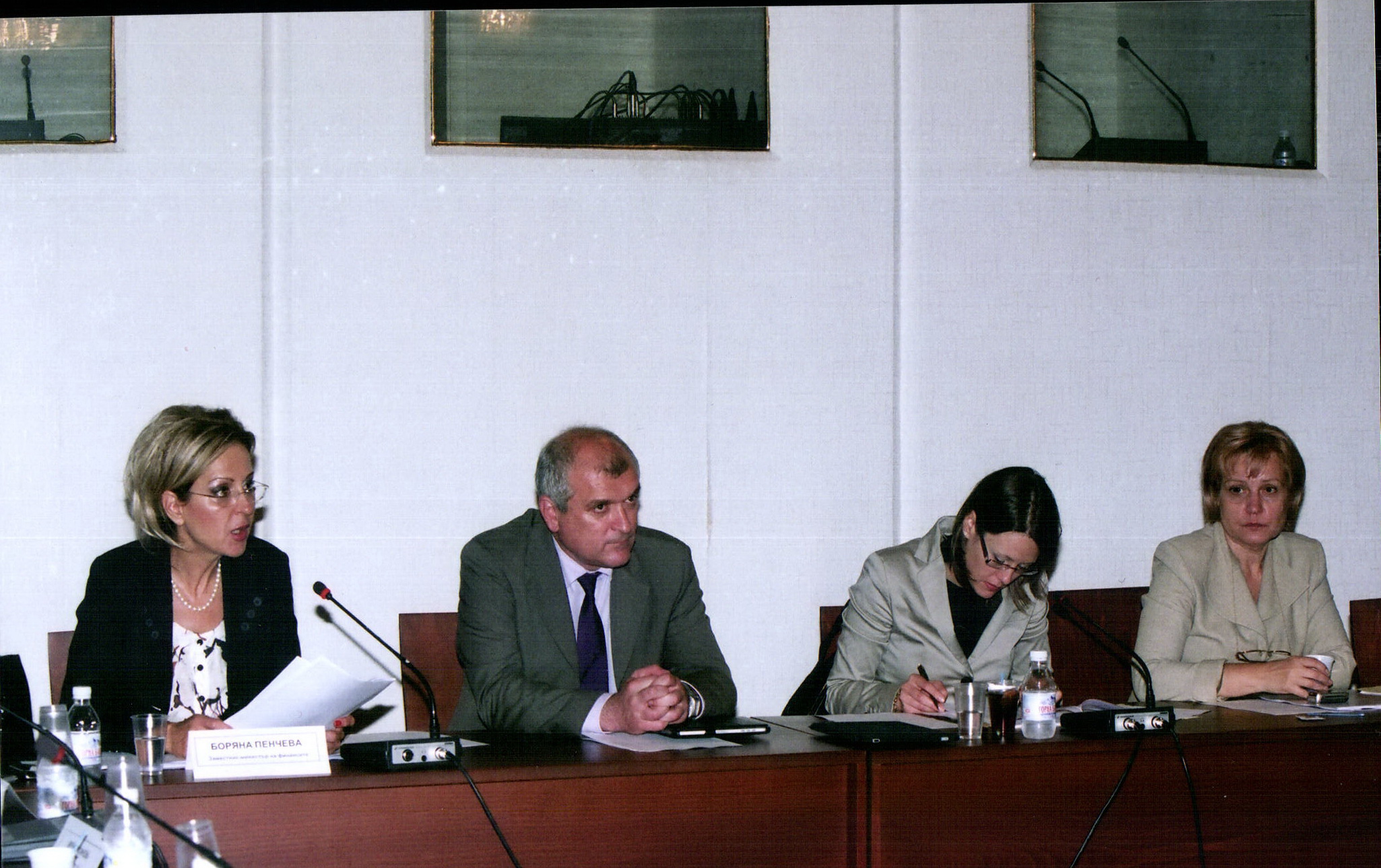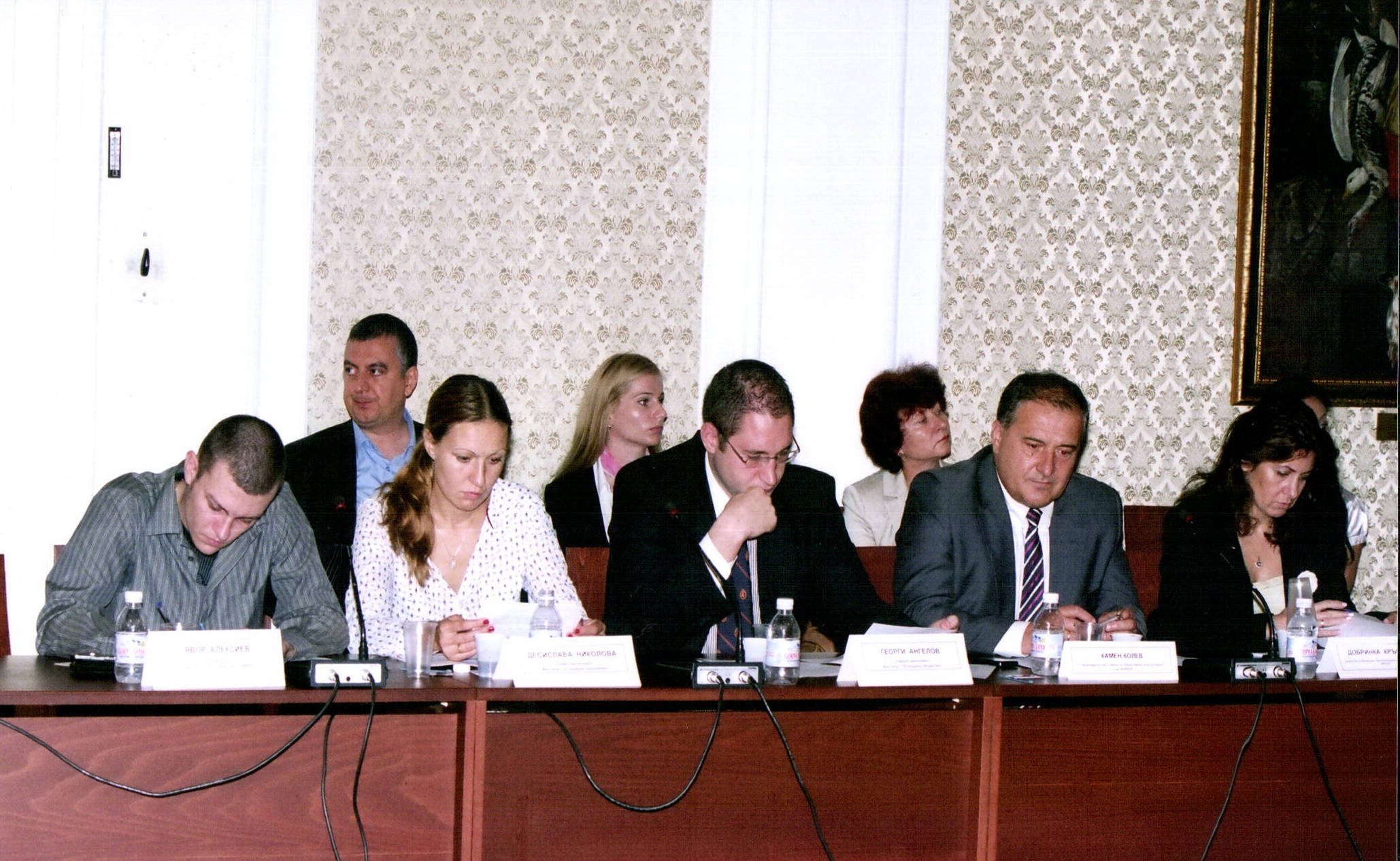Parliamentary Committees
Committee on European Affairs and Oversight of the European Funds
The Members of Parliament did not support the EC proposal on two new European taxes
21/09/2011
At a joint session held on 21 September 2011, the Committee on European Affairs and Oversight of the European Funds (CEAOEF) and the Budget and Finance Committee (BFC) reviewed the package of six legislative proposals of the European Commission concerning the new Multiannual Financial Framework 2014-2020, included in the Annual Working Programme of the National Assembly on European Union Issues for 2011.
The Report of the two parliamentary committees was discussed together with representatives of the Executive Power, the NGO sector and the business. The Bulgarian Government position on the legislative package was presented by the Deputy Minister of Finance – Mrs. Boryana Pencheva. Active participation in the debate took the NGO representatives – Georgi Angelov, Senior Economist in the Open Society Institute, Desislava Nikolova – Chief Economist in the Institute for Market Economy and Kamen Kolev – Vice President of the Bulgarian Industrial Association.
The Members of both parliamentary committees welcomed the MFF as a financial instrument for achieving the Europe 2020 goals. They pointed out that the MFF expenditure items (1 025 blln. Euro or 1,05 % of the EU GNI) are in line with the Bulgarian targets. They underlined that it is important to take into account the country capabilities as they are outlined in the National Reform Programme of the Republic of Bulgaria (2011-2015).
Among the MFF key policies, the MPs discussed the expenditure items which are of great importance for Bulgaria, namely the Cohesion policy, the Common Agricultural Policy, the external borders control and illegal migration management, as well as the Neighborhood and Development Policy.
The MPs underlined the need for increase of the Cohesion Policy expenditures with an accent on fostering the basic infrastructure development.
In line with the greater powers of the national parliaments vested by the Lisbon Treaty to participate in the decision-making process at the earliest possible stage, the two parliamentary committees stated their principal concerns on the MFF revenue side. In this regard, they all assumed that the reform of the System of own resources via the introduction of Financial Transactions Tax (FTT) and European Value Added Tax (EVAT) would lead to an additional tax burden for the EU citizens and business, and would provoke negative attitudes to the EU among the European tax payers.
The MPs unanimously agreed that the focus shift from GNI to additional taxes in the EU budget installment formation will not take into account the actual economic development of the Member States.
According to the MPs a new FTT at EU level would lead to loss of competitive advantages for the financial institutions within the EU, and also, to loss of competitiveness for the European financial markets in general – deals moving into new markets (regions). For the countries with insufficiently developed stock markets such as Bulgaria, a new taxation would further jeopardize their development and reduce the alternative options for financing the business.
The Bulgarian Parliament Statement on the new MFF, expressed via the CEAOEF and BFC, will be sent to the European Commission and the European Parliament in the framework of the intensive political dialogue.
The Report of the two parliamentary committees was discussed together with representatives of the Executive Power, the NGO sector and the business. The Bulgarian Government position on the legislative package was presented by the Deputy Minister of Finance – Mrs. Boryana Pencheva. Active participation in the debate took the NGO representatives – Georgi Angelov, Senior Economist in the Open Society Institute, Desislava Nikolova – Chief Economist in the Institute for Market Economy and Kamen Kolev – Vice President of the Bulgarian Industrial Association.
The Members of both parliamentary committees welcomed the MFF as a financial instrument for achieving the Europe 2020 goals. They pointed out that the MFF expenditure items (1 025 blln. Euro or 1,05 % of the EU GNI) are in line with the Bulgarian targets. They underlined that it is important to take into account the country capabilities as they are outlined in the National Reform Programme of the Republic of Bulgaria (2011-2015).
Among the MFF key policies, the MPs discussed the expenditure items which are of great importance for Bulgaria, namely the Cohesion policy, the Common Agricultural Policy, the external borders control and illegal migration management, as well as the Neighborhood and Development Policy.
The MPs underlined the need for increase of the Cohesion Policy expenditures with an accent on fostering the basic infrastructure development.
In line with the greater powers of the national parliaments vested by the Lisbon Treaty to participate in the decision-making process at the earliest possible stage, the two parliamentary committees stated their principal concerns on the MFF revenue side. In this regard, they all assumed that the reform of the System of own resources via the introduction of Financial Transactions Tax (FTT) and European Value Added Tax (EVAT) would lead to an additional tax burden for the EU citizens and business, and would provoke negative attitudes to the EU among the European tax payers.
The MPs unanimously agreed that the focus shift from GNI to additional taxes in the EU budget installment formation will not take into account the actual economic development of the Member States.
According to the MPs a new FTT at EU level would lead to loss of competitive advantages for the financial institutions within the EU, and also, to loss of competitiveness for the European financial markets in general – deals moving into new markets (regions). For the countries with insufficiently developed stock markets such as Bulgaria, a new taxation would further jeopardize their development and reduce the alternative options for financing the business.
The Bulgarian Parliament Statement on the new MFF, expressed via the CEAOEF and BFC, will be sent to the European Commission and the European Parliament in the framework of the intensive political dialogue.
 Български
Български English
English


